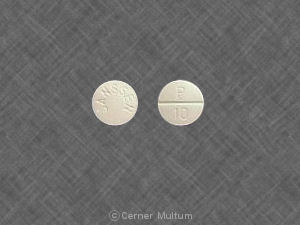Propulsid Dosage
Generic name: cisapride 10mg
Dosage form: tablets, suspension
Drug class: GI stimulants
Medically reviewed by Drugs.com. Last updated on Sep 26, 2024.
5 mL (1 teaspoon) suspension = 5 mg.
A 12-lead ECG should be performed prior to administration of PROPULSID® (cisapride). Treatment with PROPULSID® should not be initiated if the QTc value exceeds 450 milliseconds. Serum electrolytes (potassium, calcium, and magnesium) and creatinine should be assessed prior to administration of PROPULSID® and whenever conditions develop that may affect electrolyte balance or renal function.
Adults: Initiate therapy with one 10 mg tablet of PROPULSID® or 10 mL of the suspension 4 times daily at least 15 minutes before meals and at bedtime. In some patients the dosage will need to be increased to 20 mg, given as above, to obtain a satisfactory result.
Caution must be exercised in elderly patients since there is a significant proportion who have conditions or use other drugs which contraindicate the use of PROPULSID®. A 12-lead ECG and serum electrolyte measurement should be performed prior to treatment with PROPULSID®. In elderly patients, steady-state plasma levels are generally higher due to a moderate prolongation of the elimination half-life. Therapeutic doses, however, are similar to those used in younger adults.
It is recommended that the daily dose be halved in patients with hepatic insufficiency.
The minimum effective dose of PROPULSID® should be used. Recommended doses should not be exceeded. PROPULSID® should be discontinued if relief of nocturnal heartburn does not occur.
More about Propulsid (cisapride)
- Check interactions
- Compare alternatives
- Reviews (1)
- Drug images
- Side effects
- During pregnancy
- Drug class: GI stimulants
- Breastfeeding
Patient resources
Professional resources
Related treatment guides
See also:
Further information
Always consult your healthcare provider to ensure the information displayed on this page applies to your personal circumstances.


